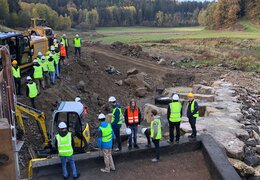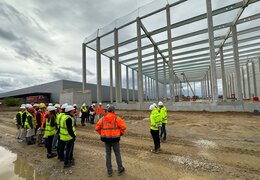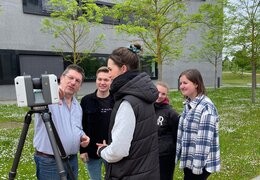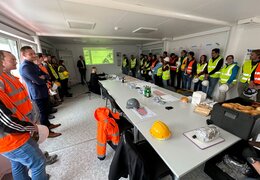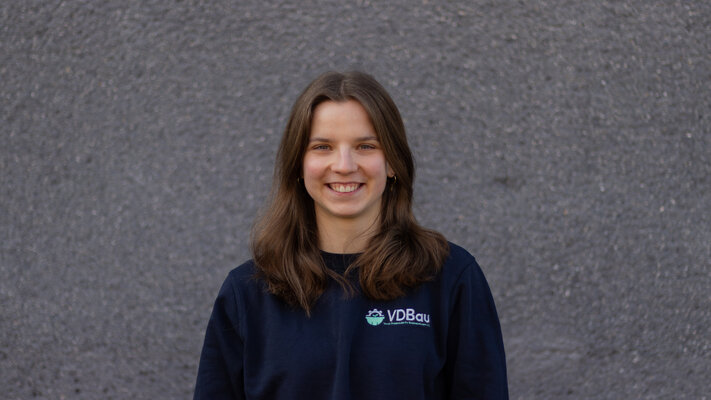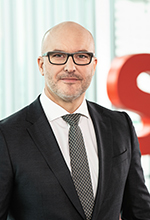Carina Hartl
2025 | Bachelor Civil and Construction Engineering

Career Development
I became interested in construction at the age of twelve, when our family built our own house. My parents often took me to the building site and did a lot of the work themselves. I quickly realized that I wanted to create something later on - not just at my desk, but directly on site.
I was initially interested in becoming an architect because I liked drawing. That's why I decided to do an internship at an architecture firm in grade 9. There I also got to know civil engineers, who explained the differences between the two professions to me. I realized that I was even more fascinated by the technical side of construction, which is why I became increasingly interested in civil engineering.
To further solidify my decision, I attended DIT's TastING program and completed an early study program to gain an initial insight into the course. I had the opportunity to take part in the construction industry's Baumangercamp - a perfect way to get to know professions in the construction industry, especially that of a civil engineer, at first hand. For a week, we worked together on an exciting project: the planning and construction of a “sit-in”, a bench for the local soccer club. The main focus was on teamwork, organization and practical construction. This experience gave me valuable insights into the versatility of the construction industry and further strengthened my career aspirations. I also did internships in a planning office and a construction company to get to know different perspectives of the civil engineering profession. There I also became aware of the possibility of a dual study program, which ideally combines theory and practice.
For this reason, I opted for a dual study program with in-depth practical experience at the construction company MAX STREICHER in Deggendorf. During the practical phases, I was able to immerse myself in different areas such as the building materials laboratory, road construction and bridge construction. I completed my practical semester in the Digital and Municipal Infrastructure (DKI) department, which deals with local network construction. I was a little skeptical at first, as I was more interested in building visible structures. But I quickly realized how versatile and impressive network construction can be.
In my last practical phase between the 6th and 7th semester, I returned to DKI, worked there two days a week during my last semester and wrote my thesis in this department. The combination of technical challenges, practical implementation and the opportunity to design sustainable infrastructures inspired me.
Today, I look forward with great anticipation to my future as a construction manager in network construction and look forward to putting my passion for construction into practice.
Reminiscing allowed: remember your student days
I have many fond memories of my time at DIT - both of my studies and of student life. I particularly like to think back to the regulars' tables at Otto, the legendary Kneipenhupfa, the Christmas parties and our graduation trip. These events were not only a lot of fun, but also encouraged exchange with fellow students from different semesters and degree programs.
The contact with other students was incredibly valuable - whether it was for tips and tricks for studying, discussing old exams or simply for good conversations. I have particularly fond memories of studying together with my fellow students. Our afternoon Zoom meetings not only made learning more effective, but also more entertaining. Thanks to these virtual meetings, we were never alone, we were able to motivate each other and get through the exam phases together.
Our excursion to the Brenner Base Tunnel at the end of semester 7 was an unforgettable experience. Standing on a tunnel boring machine in the middle of the construction work on the longest tunnel in the world was simply breathtaking and a unique experience!
Without these experiences, my studies would have been much more strenuous - and I would not have made so many valuable friends. For me, DIT was not only a place of learning, but also a time full of community, solidarity and unforgettable moments.
What advice would you give to today's students?
Enjoy your time at university - it is a special phase in your life that will never come back! Take the opportunity to take part in student events, meet new people and exchange ideas with your fellow students. A good network not only makes studying easier, but also more exciting and varied.
Also get involved in new experiences! Try out different subjects, even if they don't arouse your main interest at first glance. You often only realize over time what really suits you. Take every opportunity to gain experience, be it through internships, excursions or voluntary projects.
And above all: have fun, stay open to new opportunities and make the most of your time at university!






